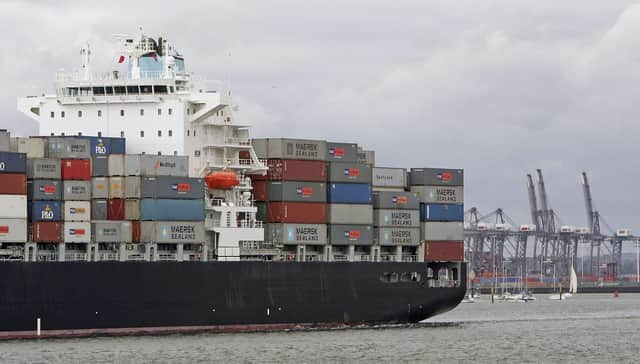Freeports will be created in England to help to boost the economy - here’s how they work


Chancellor Rishi Sunak has revealed plans to create freeports in England.
During his Budget announcement on Wednesday 3 March, Mr Sunak unveiled the locations of eight new “special economic zones with different rules to make it easier and cheaper to do business”.
Advertisement
Hide AdAdvertisement
Hide AdThe chancellor said the freeports would help to boost the economy.
There are about 3,500 of these zones around the world which employ 66 million people.
So, what are freeports, why is the chancellor bringing them back - and where are they going to be in England?
Here is everything you need to know.
What is a freeport?
Freeports are typically located around shipping ports or airports.
Advertisement
Hide AdAdvertisement
Hide AdAlso known as free trade zones, they are designated areas where a country’s usual tax and tariff rules do not apply.
Goods in freeports can be imported, manufactured and exported without being subject to checks, paperwork or tariffs.
For example, raw materials could be imported from abroad and made into whole products for exporting overseas without any charges being paid.
Taxes would only be paid if the goods left the freeport and were moved elsewhere in the UK.
Advertisement
Hide AdAdvertisement
Hide AdThere were seven freeports operating in the UK between 1984 and 2012, including in Liverpool, Southampton the Port of Tilbury, the Port of Sheerness and Prestwick Airport.
The legislation establishing them was not renewed.
Around 135 countries around the world have free trade zones, and a 2013 US Congressional report estimated there were roughly 3,500 globally.
There are around 80 freeports in the EU.
Why are freeports being brought back?
The idea for freeports was originally floated as a post-Brexit opportunity to stimulate global trade and create opportunities in the UK, as part of the government's plans for “levelling-up”.
Ministers hope that the new freeports will help to regenerate more deprived areas in the country.
Advertisement
Hide AdAdvertisement
Hide AdMr Sunak said the freeports would have “simpler planning”, “cheaper customs – with favourable tariffs, VAT or duties”, and lower taxes, with “tax breaks to encourage construction, private investment and job creation”.
Companies inside the new sites will be offered temporary tax breaks, which will mostly last for five years.
That includes reductions to the tax companies pay on existing property, and when they purchase new buildings.
Employers will also pay reduced national insurance for new workers.
Advertisement
Hide AdAdvertisement
Hide AdWhile some say freeports can help to increase manufacturing, jobs and investment in poorer areas, critics claim they do not boost employment overall and moving economic activity from one area to another costs the taxpayer.
Labour has previously argued that freeports could attract money launderers and tax dodgers.
The governments in Scotland, Wales and Northern Ireland are expected to announce their own freeport policies.
Where are the eight new locations?
More than 30 areas in England reportedly bid to become a freeport.
Advertisement
Hide AdAdvertisement
Hide AdThe bids were scored against varying factors, including showing how a freeport could bring economic benefits to poorer regions.
Prime Minister Boris Johnson has previously outlined his plans for “levelling up” deprived places in the UK.
Other criteria, like the impact of the coronavirus crisis on local areas and making sure freeports were “spread fairly” across the country, were also looked at.
The locations of the eight new freeports are:
- East Midlands Airport
- Felixstowe and Harwich
- Humber region
- Liverpool City Region
- Plymouth
- Solent
- Thames
- Teesside.
The Teesside freeport is set to be the largest, spanning 4,500 acres - the equivalent of 2,550 football pitches.